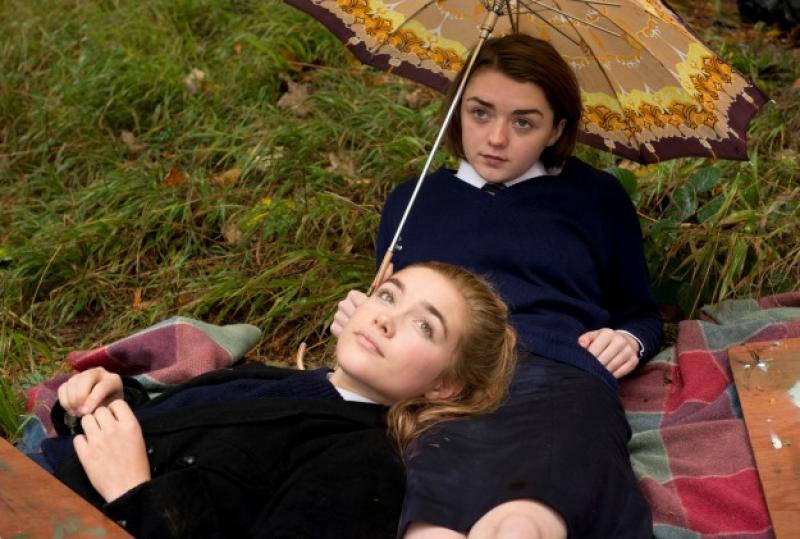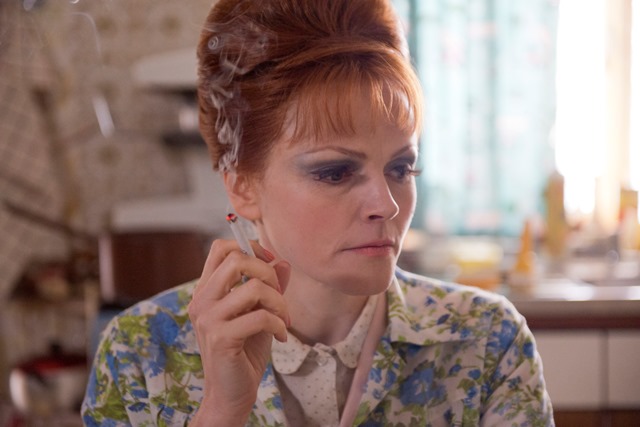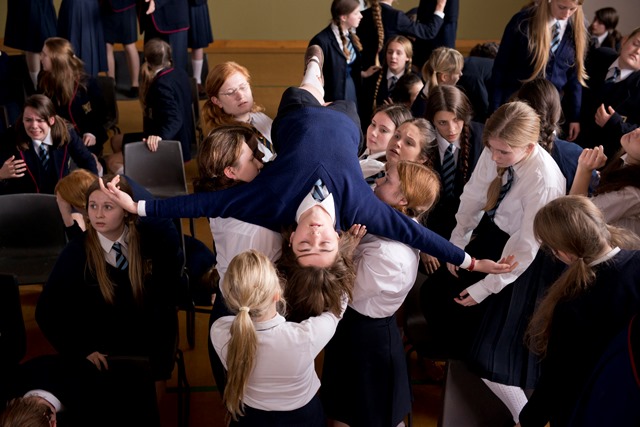The Falling | reviews, news & interviews
The Falling
The Falling
Fainting, growing pains and the occult in Carol Morley’s seductive filmic waking-dream

The pupils at a girl’s school are afflicted by fainting. It’s spreading. A teacher is affected too. The epidemic began after Lydia and Abbie's friendship has irrevocably ended. Lydia became the first to faint. The school’s headmistress, Miss Alvaro, is determined to ignore what’s going on and ascribe it to baseless hysteria. The stern teacher Miss Mantel is equally unyielding. When medical examinations are finally undertaken, no causes are determined.
The Falling is, after Edge, director Carol Morley’s second fiction feature. She is better known for the otherworldly documentary Dreams of a Life. Her new film shares a sense of unreality with her previous work – the world she creates borders on the magical-realist. Passing references to the occult and suggestions of the mystical powers of the landscape feature. At one point, the schoolgirls link hands as if in a ritual.
 The Falling is also – again in common with Morley’s other work – about outsiders and those cut off from the rest of society. In the case of Dreams of a Life it was the deceased Joyce Vincent, who had lain dead in her home for over two years before her body was found: Morley sought to recreate elements of Vincent’s life. With The Falling, characters are also somehow apart from the day-to-day world. Lydia’s work-at-home hairdresser mother is agoraphobic and won’t leave the house (pictured right, Maxine Peake).
The Falling is also – again in common with Morley’s other work – about outsiders and those cut off from the rest of society. In the case of Dreams of a Life it was the deceased Joyce Vincent, who had lain dead in her home for over two years before her body was found: Morley sought to recreate elements of Vincent’s life. With The Falling, characters are also somehow apart from the day-to-day world. Lydia’s work-at-home hairdresser mother is agoraphobic and won’t leave the house (pictured right, Maxine Peake).
The setting is rural Oxfordshire in 1969. In the school’s fifth form, Abbie is a rebel – the girl everyone would want to be. Her skirt is too short; she has a love bite and is sexually active. Lydia dotes on her but is buttoned-up and intense. Abbie seems to be growing up and suspects she is pregnant, but Lydia doesn’t want this version of the adult world and their relationship is soon and very suddenly over. Their friendship cannot be revived; the faintings begin. Lydia's brother Kenneth suspects a supernatural cause.
 As the film progresses, the reasons for the fainting become more and more opaque. It may be spontaneous; it may be an escape from adulthood. For Lydia, her home life with a single, shut-in mum may be the trigger. Doctors want to prescribe tranquilisers rather than look for a cause. Reality is further stretched by the nature of the characters' interactions with one another. Many verbal exchanges are flatly telegrammatic. It’s as if the schoolgirls and their teachers are automatons. Are they under a spell? (Pictured left, a Christ-like pose for Maisie Williams's Lydia after she faints.)
As the film progresses, the reasons for the fainting become more and more opaque. It may be spontaneous; it may be an escape from adulthood. For Lydia, her home life with a single, shut-in mum may be the trigger. Doctors want to prescribe tranquilisers rather than look for a cause. Reality is further stretched by the nature of the characters' interactions with one another. Many verbal exchanges are flatly telegrammatic. It’s as if the schoolgirls and their teachers are automatons. Are they under a spell? (Pictured left, a Christ-like pose for Maisie Williams's Lydia after she faints.)
Although an ensemble film, Maisie Williams’s Lydia is just one of the stand-out performances. Mostly forceful, her sudden shifts of gear into the pensive and sensitive convince. Conflict is never far. As chain-smoking mother Eileen Lamont, Maxine Peake is towering. Greta Scacchi’s mostly monstrous Miss Mantel is equally striking, while Florence Pugh, new to cinema, is pitch-perfect as the wounded Abbie. Only the brother Kenneth (Joe Cole) is rendered with less assurance. There is also fantastically atmospheric music by Tracey Thorn. Repeated reminders that it is 1969 – a Stylphone being played, a spacewalk seen on TV – are unnecessary.
A disant echo of The Virgin Suicides and Innocence, The Falling also nods to the hyper-real religious allegories of Bruno Dumont and shares its atmosphere with the more fantastic of the early Seventies BBC Play for Today productions. Though shot through with the tenor and themes of Morley’s determinedly singular vision, it’s not necessary to be familiar with anything she has done previously. Taken on its own terms, the film is a winner. This seductive waking-dream is a must-see.
Overleaf: watch the trailer for The Falling
Watch the trailer for The Falling
The future of Arts Journalism
You can stop theartsdesk.com closing!
We urgently need financing to survive. Our fundraising drive has thus far raised £49,000 but we need to reach £100,000 or we will be forced to close. Please contribute here: https://gofund.me/c3f6033d
And if you can forward this information to anyone who might assist, we’d be grateful.

Subscribe to theartsdesk.com
Thank you for continuing to read our work on theartsdesk.com. For unlimited access to every article in its entirety, including our archive of more than 15,000 pieces, we're asking for £5 per month or £40 per year. We feel it's a very good deal, and hope you do too.
To take a subscription now simply click here.
And if you're looking for that extra gift for a friend or family member, why not treat them to a theartsdesk.com gift subscription?
more Film
 Bugonia review - Yorgos Lanthimos on aliens, bees and conspiracy theories
Emma Stone and Jesse Plemons excel in a marvellously deranged black comedy
Bugonia review - Yorgos Lanthimos on aliens, bees and conspiracy theories
Emma Stone and Jesse Plemons excel in a marvellously deranged black comedy
 theartsdesk Q&A: director Kelly Reichardt on 'The Mastermind' and reliving the 1970s
The independent filmmaker discusses her intimate heist movie
theartsdesk Q&A: director Kelly Reichardt on 'The Mastermind' and reliving the 1970s
The independent filmmaker discusses her intimate heist movie
 Blu-ray: Wendy and Lucy
Down-and-out in rural Oregon: Kelly Reichardt's third feature packs a huge punch
Blu-ray: Wendy and Lucy
Down-and-out in rural Oregon: Kelly Reichardt's third feature packs a huge punch
 The Mastermind review - another slim but nourishing slice of Americana from Kelly Reichardt
Josh O'Connor is perfect casting as a cocky middle-class American adrift in the 1970s
The Mastermind review - another slim but nourishing slice of Americana from Kelly Reichardt
Josh O'Connor is perfect casting as a cocky middle-class American adrift in the 1970s
 Springsteen: Deliver Me From Nowhere review - the story of the Boss who isn't boss of his own head
A brooding trip on the Bruce Springsteen highway of hard knocks
Springsteen: Deliver Me From Nowhere review - the story of the Boss who isn't boss of his own head
A brooding trip on the Bruce Springsteen highway of hard knocks
 The Perfect Neighbor, Netflix review - Florida found-footage documentary is a harrowing watch
Sundance winner chronicles a death that should have been prevented
The Perfect Neighbor, Netflix review - Florida found-footage documentary is a harrowing watch
Sundance winner chronicles a death that should have been prevented
 Blu-ray: Le Quai des Brumes
Love twinkles in the gloom of Marcel Carné’s fogbound French poetic realist classic
Blu-ray: Le Quai des Brumes
Love twinkles in the gloom of Marcel Carné’s fogbound French poetic realist classic
 Frankenstein review - the Prometheus of the charnel house
Guillermo del Toro is fitfully inspired, but often lost in long-held ambitions
Frankenstein review - the Prometheus of the charnel house
Guillermo del Toro is fitfully inspired, but often lost in long-held ambitions
 London Film Festival 2025 - a Korean masterclass in black comedy and a Camus classic effectively realised
New films from Park Chan-wook, Gianfranco Rosi, François Ozon, Ildikó Enyedi and more
London Film Festival 2025 - a Korean masterclass in black comedy and a Camus classic effectively realised
New films from Park Chan-wook, Gianfranco Rosi, François Ozon, Ildikó Enyedi and more
 After the Hunt review - muddled #MeToo provocation
Julia Roberts excels despite misfiring drama
After the Hunt review - muddled #MeToo provocation
Julia Roberts excels despite misfiring drama
 London Film Festival 2025 - Bradley Cooper channels John Bishop, the Boss goes to Nebraska, and a French pandemic
... not to mention Kristen Stewart's directing debut and a punchy prison drama
London Film Festival 2025 - Bradley Cooper channels John Bishop, the Boss goes to Nebraska, and a French pandemic
... not to mention Kristen Stewart's directing debut and a punchy prison drama
 Ballad of a Small Player review - Colin Farrell's all in as a gambler down on his luck
Conclave director Edward Berger swaps the Vatican for Asia's sin city
Ballad of a Small Player review - Colin Farrell's all in as a gambler down on his luck
Conclave director Edward Berger swaps the Vatican for Asia's sin city

Add comment